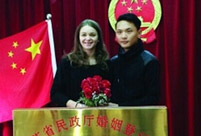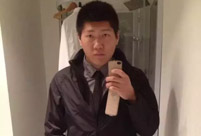

Zhang Dejiang, chairman of the Standing Committee of China's National People's Congress on Wednesday evening met with and took advice from 10 members of Hong Kong's Legislative Council, including four pan-democratic lawmakers from opposition camp, during his inspection visit to the Special Administrative Region (SAR). Hong Kong media, which attaches great importance to Zhang's tour, has paid close attention to this meeting.
Legislators who attended the conference voiced their discontent toward Hong Kong Chief Executive Leung Chun-ying, and asked the central government to replace him. This is the first ever face-to-face discussion between a central government leader and pan-democratic legislators, and the latter called the meeting a "significant breakthrough." The meeting was indeed groundbreaking. If it can make Hong Kong's pan-democracy camp cooperate with the Chinese mainland more proactively over the implementation of one country, two systems, as well as form a new way of interacting between the two sides, it would be a great deed.
Opposition legislators are supposed to be a "special pan-establishment camp" even though they are in an opposition category. They are elected through the SAR's political system designed by the Basic Law. As long as they act in accordance with the law, they are part of Hong Kong's unique political landscape. The region should provide them room for their political activities. They should also be loyal to the Basic Law, fulfill their duties and make contributions to maintain Hong Kong's operations.
If yesterday's reports are verified, although the legislators' demand to dismiss Leung was sharp, still, they have every right to make this request. However, it does not mean the central government should accept it.
The right of appointment and replacement of the SAR's chief executive belongs to the central government, advice beyond the rules over the Hong Kong chief executive election from the Basic Law is not authoritative, and the Basic Law must be fully respected and carried out.
For the moment, a handful of Hongkongers disregard the Basic Law and run counter to the central government. Their behavior has nothing to do with democracy, but is severely disruptive to Hong Kong's rule of law. If Hong Kong's opposition groups have complaints, they can express their views, which should be carried out within the SAR's internal affairs, rather than protesting against the Basic Law.
Zhang's meeting with pan-democratic lawmakers showed the good faith from the central government, while the pan-democrats also demonstrated their respect for the authority of the central government. This was an unprecedented interaction, which has provided hope for some people.
Opposition camp in Hong Kong should be well aware that the SAR's return to the mainland is being constantly consolidated. The process will never be reversed. There won't be any place for those against the central government in Hong Kong's political framework. To put it bluntly, the forces confronting the central government will find themselves in a blind alley eventually.
 French girl ties the knot with Chinese boy
French girl ties the knot with Chinese boy Beijing Style: ready for bare legs
Beijing Style: ready for bare legs Century-old station sees railyway evolution
Century-old station sees railyway evolution Enthusiasts perform Kung Fu at Wudang Mountain
Enthusiasts perform Kung Fu at Wudang Mountain Stunning photos of China's fighter jets in drill
Stunning photos of China's fighter jets in drill Monk's mummified body to be made into a gold Buddha statue
Monk's mummified body to be made into a gold Buddha statue Former Chinese solider of the French Foreign Legion seeks wife online
Former Chinese solider of the French Foreign Legion seeks wife online Asia's longest and highest suspension bridge to open to traffic
Asia's longest and highest suspension bridge to open to traffic China's first interactive robot looks like a beauty
China's first interactive robot looks like a beauty Top 20 hottest women in the world in 2014
Top 20 hottest women in the world in 2014 Top 10 hardest languages to learn
Top 10 hardest languages to learn 10 Chinese female stars with most beautiful faces
10 Chinese female stars with most beautiful faces China’s Top 10 Unique Bridges, Highways and Roads
China’s Top 10 Unique Bridges, Highways and Roads Chongqing blazes trail with PPP
Chongqing blazes trail with PPP Only 5% of LGBTI Chinese are ‘out’
Only 5% of LGBTI Chinese are ‘out’ Six Assurances to Taiwan only empty promises
Six Assurances to Taiwan only empty promises Chinese-Filipino community tries to heal rift as South China Sea spat worsens ties
Chinese-Filipino community tries to heal rift as South China Sea spat worsens tiesDay|Week